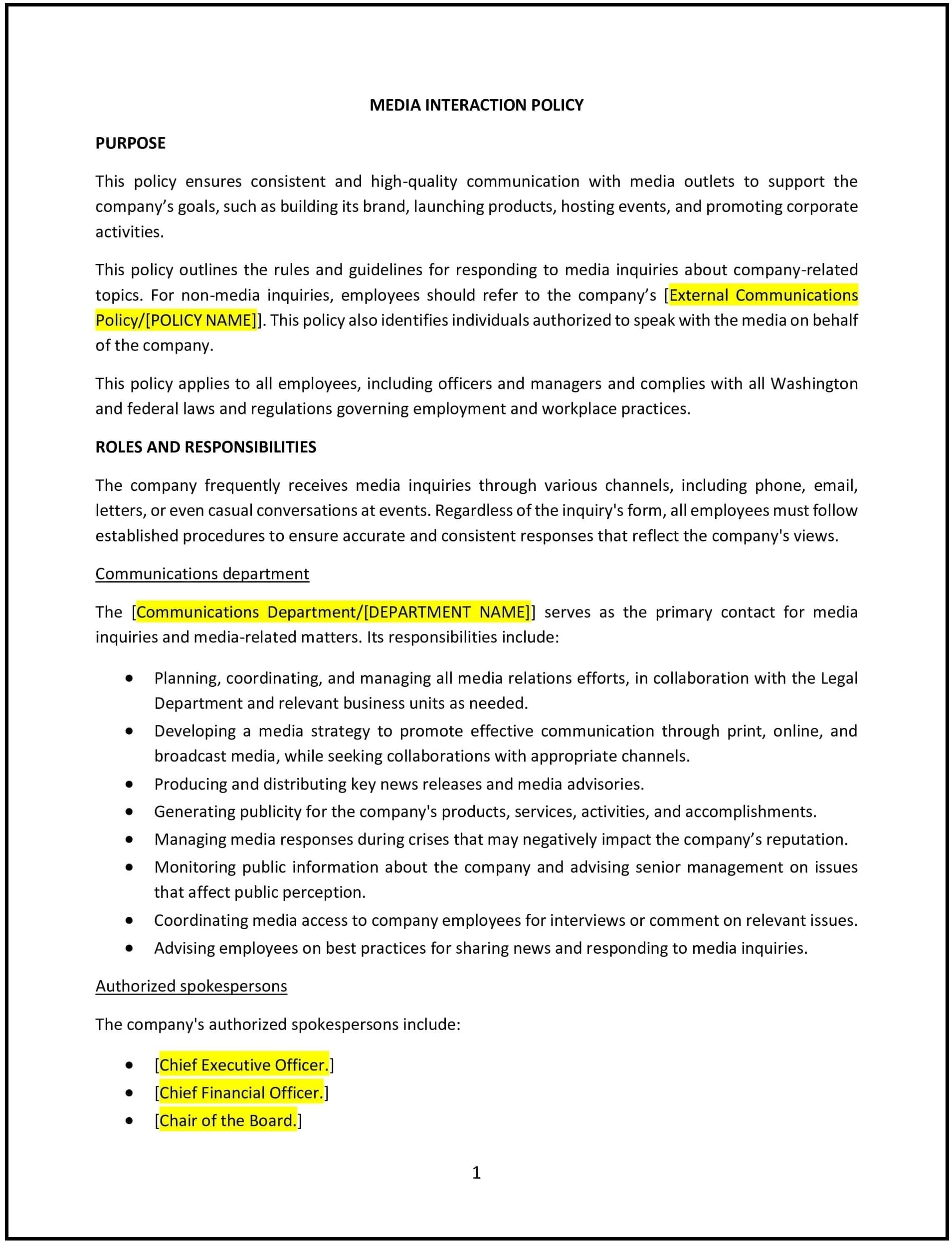Got contracts to review? While you're here for policies, let Cobrief make contract review effortless—start your free review now.

Customize this template for free
This media relations policy is designed to help Washington businesses effectively manage their interactions with the media, including press inquiries, public statements, and press releases. The policy outlines the procedures for engaging with journalists, maintaining the company’s brand and reputation, and ensuring that all media communication aligns with the company’s goals and legal obligations. It provides clear guidelines on who is authorized to speak to the media and how to respond to media inquiries in a professional, consistent manner.
By adopting this policy, businesses can manage media relationships proactively, protect their public image, and ensure that their communications are aligned with company values and legal requirements.
How to use this media relations policy (Washington)
- Define media spokespersons: The policy should designate specific employees or departments responsible for engaging with the media. This typically includes senior leadership, PR professionals, or communication experts. Employees should be instructed to direct all media inquiries to the designated spokesperson(s).
- Establish procedures for responding to media inquiries: Outline the process for responding to media inquiries, including who is responsible for answering questions and how to assess the urgency and relevance of a request. The policy should also emphasize the importance of responding in a timely and accurate manner.
- Set guidelines for public statements and press releases: The policy should provide guidelines for issuing public statements and press releases. This includes establishing procedures for approval, ensuring that messages are consistent with company values, and coordinating with legal or regulatory teams before releasing sensitive information.
- Protect sensitive and confidential information: The policy should include instructions on safeguarding confidential information, including trade secrets, financial data, and personal employee or customer information. Employees should be reminded not to disclose sensitive or proprietary details to the media without proper authorization.
- Provide guidance on social media interactions: Given the growing importance of social media, the policy should outline how employees should interact with the media via social media channels. It should specify what can and cannot be shared on platforms like Twitter, LinkedIn, or Facebook and ensure that employees understand the implications of social media communications.
- Address crisis communications: The policy should outline a clear plan for managing media communications during a crisis or emergency situation, including designating a crisis communications team and preparing pre-drafted messaging to ensure a swift and coordinated response.
- Promote compliance with Washington state and federal laws: The policy should comply with Washington state laws, federal regulations, and industry-specific guidelines related to communications, such as advertising laws, defamation laws, and privacy regulations.
- Review and update regularly: Periodically review and update the policy to ensure it remains compliant with changes in Washington state laws, federal regulations, and evolving communication practices. Regular updates will help ensure the policy stays relevant and effective.
Benefits of using this media relations policy (Washington)
This policy offers several benefits for Washington businesses:
- Protects the company’s reputation: By establishing clear guidelines for media interactions, the policy helps protect the company’s public image and ensures that all media communications are professional, consistent, and aligned with company values.
- Ensures consistent messaging: The policy ensures that all employees who interact with the media deliver consistent and accurate information, helping to avoid mixed messages and potential misunderstandings.
- Reduces legal risks: The policy reduces the risk of legal issues related to media communications, such as defamation, violations of privacy, or the unauthorized disclosure of sensitive information. It ensures that employees are trained on how to handle these risks appropriately.
- Improves crisis management: With pre-established procedures and guidelines, the policy ensures that the company can respond effectively during a crisis, mitigating reputational damage and maintaining control of the narrative.
- Enhances media relationships: By setting expectations and fostering transparency, the policy helps build strong, positive relationships with journalists and media outlets. This can lead to better coverage, more accurate reporting, and improved visibility for the company.
- Aligns with company values: The policy ensures that all media communications align with the company’s values, mission, and legal obligations, which helps maintain trust with stakeholders, customers, and the public.
Tips for using this media relations policy (Washington)
- Communicate the policy clearly: Ensure all employees understand the media relations policy and their role in interacting with the media. Include the policy in the employee handbook, review it during onboarding, and provide periodic training on handling media inquiries.
- Designate a media spokesperson: Identify and train specific employees or departments who are responsible for engaging with the media. Ensure they are well-prepared to answer questions and communicate effectively on behalf of the company.
- Respond promptly to media inquiries: Ensure that all media inquiries are handled quickly and professionally. Set clear timelines for responding to requests and ensure that the company’s spokespersons are available as needed.
- Use social media responsibly: Establish guidelines for employee social media usage, particularly in situations where employees may be interacting with the media or commenting on the company’s products or services. Ensure that employees understand the implications of social media posts.
- Monitor media coverage: Regularly monitor media coverage of the company to ensure that messaging is consistent and to identify any potential issues that need to be addressed. This can help manage reputation proactively.
- Review and update regularly: Periodically review the policy to ensure it remains compliant with Washington state laws, federal regulations, and any changes in the company’s operations. Regular updates will help keep the policy relevant and effective.